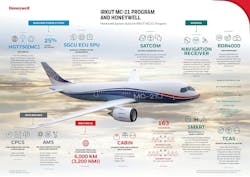What is the Irkut MC-21 commercial airliner, and why is the new aircraft unique?
Irkut Corp., a member of the United Aircraft Corp. (UAC) in Moscow, Russia, is rapidly advancing the company’s new MC-21 single-aisle twinjet commercial airliner, which just completed its maiden flight. The MC-21 incorporates electronics systems and components from various aerospace firms, including: Rockwell Collins, Honeywell, Thales, Elbit Systems, UTC Aerospace Systems (Goodrich Corp. and Hamilton Sundstrand), Zodiac Aerospace, Eaton, and Meggitt.
MC-21 systems and components include:
Hamilton Sundstrand, a subsidiary of United Technologies, electric power generation and distribution equipment
Honeywell, Thales, and Elbit Systems avionics with 9-inch by 12-inch multifunction displays, electronic flight bags, synthetic vision, and enhanced vision systems
UTC Aerospace Systems active side-stick controls
Goodrich Corporation, a subsidiary of United Technologies, flight control system actuators
Zodiac Aerospace, Eaton, and Meggitt components
The MC-21 narrow-body commercial aircraft is designed to meet high demands for comfort and economic effectiveness through advanced technical solutions in aerodynamics, engine-building, and avionics, officials say.
MC-21 aircraft is designed with:
- the biggest fuselage diameter in the category of narrow-body aircraft
- an ergonomic pilot cabin
- wings made of polymer composite materials
- 30% share of composites
- two options of power plant: PW1400G of Pratt & Whitney Company (USA) or PD-14 of United Engine Corporation (Russia)
- new-generation engines with reduced fuel consumption, low noise, and low emissions
Read about the MC021 maiden flight.
The initial portfolio of firm orders for 175 MC-21 aircraft provides utilization of production capacity in the coming years. All firm contracts are prepaid.
Hamilton Sundstrand, a subsidiary of United Technologies, provides electric power generation and distribution equipment, under a $2.3 billion contract over 20 years of production.
Rockwell Collins and its Russian partner Avionika supply the avionics.
Honeywell, Thales, and Elbit Systems supply avionics with 9-inch by 12-inch multifunction displays, electronic flight bags, synthetic vision, and enhanced vision systems.
The MC-21 is the first airliner with active sidesticks, supplied by UTC Aerospace Systems. It has a glass cockpit with side-stick controls and an optional head-up display (HUD).
Goodrich Corporation, a subsidiary of United Technologies, and Aviapribor provide the flight control system actuators.
Zodiac Aerospace, Eaton, and Meggitt provide additional components.
The new Russian-built commercial aircraft is intended to compete with Airbus A320 and Boeing 737 airliners.
The MC-21 uses the Orion audio management system from Orbit Communications Systems Ltd. (TASE:ORBI), customized for Irkut by the UAC Integration Center.
Orion is powered by a patented Dual IP Ring topology, which forms the foundation for Orion’s key benefits:
· 3D Audio
· Adaptive noise reduction
· Voice-activated detection
· Incremental scalability and flexibility to suit any size civil or military aircraft
· Inherent redundancy
· Reduced weight
AIRBORNE AVIONICS
The avionics’ improved technical characteristics and performances have been achieved by employment of the open architecture design based on standardized integrated modular avionics.
МС-21 open type architecture and the standardizing of the hardware and software units ensure the avionics system two- to threefold reliability level increase, significantly reduce power consumption, weight, and size, as well as provide a twofold reduction of the lifecycle cost.
The functional and technical characteristics of МС-21 avionics match the level of higher class aircraft, that is, the current generation wide-body airliners.
The high accuracy navigation equipment and the enhanced capability radio communication equipment ensure safe operation of the aircraft in adverse weather conditions.
INTEGRATED FLIGHT CONTROL SYSTEM
МС-21 aircraft family integrated flight control system is based on the fly-by-wire technology, which significantly reduces the aircraft weight and maintenance cost.
МС-21 incorporates the latest generation fly-by-wire technology, which includes active side stick controllers, combining the advantages of the side stick and the traditional yoke based control principles. The active side stick provides the pilot with the feedback of the aerodynamic flight conditions and the warning of proximity to the operational limits.
The automatic control system offers a full range of functions of control of the aircraft motion and position, including IIIB category auto landing.
ELECTRONIC FLIGHT BAG
The Electronic Flight Bag is indispensable for aircrew both at the stage of flight preparation and in flight. The Electronic Flight Bag releases the crew from the routine chores involving large amounts of paperwork, offers a capability of quick search and display of documents in digital format.
INFORMATION DISPLAY SYSTEM
The integrated information display system comprises wide-format (9”х12”) multifunctional colour LCDs, comparable to those installed in cockpits of the current generation wide-body aircraft.
As an option, МС-21 cockpit may be equipped with a head-up flight information display (HUD).
The other on-board vision devices include the enhanced vision system (EVS) and the synthetic vision system (SVS), which improve the safety of the aircraft operation.
AIRCRAFT ELECTRIC POWER GENERATION SYSTEM
The electric power is provided by AC 115/200V, 360-800Hz unstabilized frequency system, as well as DC 27 (28) V system.
The use of unstabilized frequency generators improves the system reliability by 50%, while reducing the operating cost by approximately 30% and generally reducing the power generating system weight by 10%.
RELIABILITY
The level of МС-21 systems’ reliability meets the most stringent up-to-date international requirements.
The units of MC-21 aircraft have a longer service life and MTBFs, compared to those of other aircraft currently in service.
МС-21 aircraft incorporates an integrated on-board fault detection system for the real-time monitoring of the technical conditions of all aircraft components.
The multiple redundancy of the on-board systems ensures maximum possible flight safety.
The high-accuracy navigation instruments and the state-of-the-art radio communications ensure safe operation of the aircraft in adverse weather conditions.
Search the Aerospace & Defense Buyer's Guide
The go-to resource for Intelligent Aerospace technology news & information:
Covering key topics
Across all market segments
Subscribe to the free Intelligent Inbox e-newsletter
Subscribe to receive all the latest aerospace technology news & information, delivered directly to your e-mail inbox twice a week (Tuesdays and Thursdays). Sign upfor your free subscription to the Intelligent Inbox e-newsletter at http://www.intelligent-aerospace.com/subscribe.html.
Connect on social media
Keep pace with aerospace innovation and opportunities via your favorite social media channels. Connect with Intelligent Aerospace on Twitter (@IntelligentAero), LinkedIn,Google+, and Instagram.



